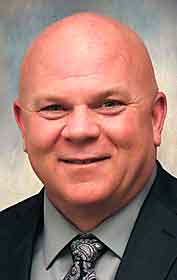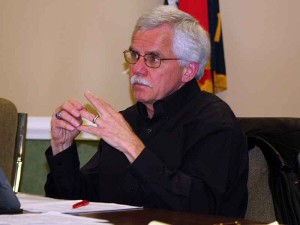Finance committee reviews ways to fund city fire department expansion
By J. ELIJAH BROOKS
Nelson County Gazette / WBRT Radio
Friday, June 5, 2015 — The Bardstown City Council’s finance committee reviewed Thursday afternoon the options the city has to increase revenues to fund plans for a fulltime fire department.
The recurring costs of the salaries and benefits for seven additional fulltime firefighter is about $553,000, which comes out of the city’s general fund. This figure does not include the cost of a new pumper/tanker fire truck that is planned for next fiscal year.
Mayor John Royalty told the committee he favored his suggestion to raise the occupational tax by one-quarter of 1 percent and to remove the existing $100,000 cap. At 3/4 of 1 percent, the resulting occupational tax would still be the lowest in the state, Larry Green, city assistant administrator, told the committee.
Removing the cap would also mean that businesses that make more than $100,000 in profits would have to pay more in taxes, and the committee discussed if it might have a negative impact on the city’s economic development.
“There’s been no mass exodus of businesses” due to occupational taxes in other Kentucky cities, Green said, noting that Bardstown is the only Kentucky city with a cap on its occupational tax.
Adding an insurance premium tax that would be added to every policy sold in the city is another option to raise revenue the council discussed.
Green’s estimate was that the city could raise $970,000 in new revenue with an insurance tax. The city council has the option of which types of insurance it wishes to tax. Some communities exempt some types of insurance, such as health insurance premiums, he said.
“Almost every city has an insurance tax,” he said.
Bardstown has never implemented an insurance tax because it always had utility revenues to fund the general fund, making it unnecessary to levy new taxes, Green said.
“We used to be proud of the fact that we didn’t have an occupational tax and we didn’t have an insurance tax, and we had low property taxes,” Green said. “When we were a much smaller town, that sufficed.”
The committee also discussed the possibility of increasing property tax rates to increase revenues by four percent. The council historically took the 4 percent revenue increase each year until the city passed its occupational tax in 2003. Since then, the city has taken the compensating rate, or the property tax rate that generates the same revenue as the previous year.
The 4 percent revenue increase would not be enough to cover the additional expenses for the next fiscal year.
The committee also discussed creating a gross receipts tax on natural gas users and for electric customers who get their electricity from Salt River or KU.
Councilman Fred Hagan asked how it would affect the city utilities if revenues were no longer transferred from from utilities to help fund the general fund.
Public Works Director Larry Hamilton told the committee that the utility reserves are in good shape, and that the city could finance its next water or sewer improvement project without going outside or a rate increase.
“We’re in as good of shape as we’ve every been,” he said. “But if we quit using the transfers, we can use the money for projects or lower the utility rates.”
The committee asked Chief Financial Officer Tracy Hudson to prepare the proposed city budget without showing new revenue that might be generated by a new tax or by raising existing taxes. The 2015-16 budget the city council will consider next week will depend on general fund reserves to fund the fire department expansion.
The committee did not make a recommendation, but will share its discussion at the council meeting on Tuesday, June 9.
-30-









